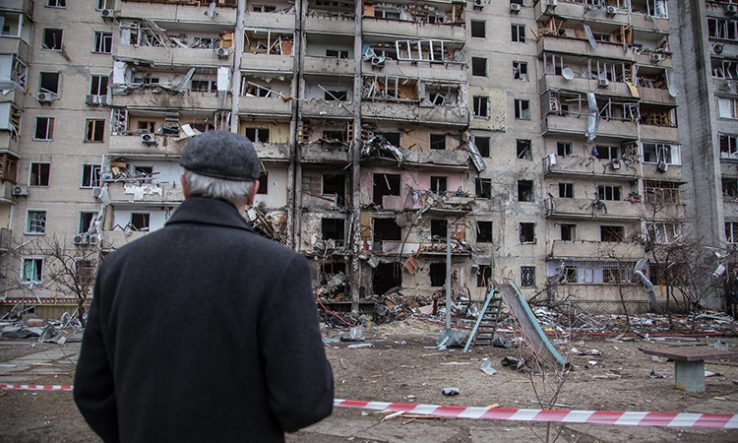
Image: UNDP Ukraine [CC BY-ND 2.0], via Flickr
UK researchers fear for colleagues in Ukraine as funders seek to pressure Russia over invasion
Long and productive research ties between scientists in the UK and their counterparts in Ukraine and Russia have ground to a halt following Russia’s bloody invasion of its neighbour.
“I do not see any research work on Ukrainian side being continued before this disaster stops,” said Peter Surai, professor at Vitagene and the Health Research Centre in Scotland, who has collaborated with Ukrainian colleagues in his work.
“I hope that the crisis will come to an end and there will be time to think how to help researchers,” he said.
Research Fortnight approached the corresponding authors on the 20 most cited papers coauthored by UK and Ukrainian scientists over the past decade. Many, including Surai, expressed deep concerns about the safety of colleagues in Ukraine where thousands of people have died and at least one university building has been destroyed along with swathes of other civilian infrastructure.
Nadzeya Kukhta, research associate at Durham University, England, says she has been “lucky to be a part of multiple fruitful collaborations with Ukrainian scientists” but has concerns “on multiple levels” about the war’s impact on research.
“Firstly, due to the ongoing war, my partners and collaborators have lost their working facilities,” she said. “Moreover, their lives and wellbeing are in danger. As such, collaborative projects have been put on hold for the time being.”
How to help
Ole Petersen, professor at the School of Biosciences at Cardiff University and another of the authors of those papers, said: “Acutely, what Ukrainian scientists need is for their country to be successful in repelling the Russian attack. Firstly, financial help both for civilian and military purposes is needed… Secondly, we must put maximum pressure on Russia to bring home to our colleagues there that the Russian war against Ukraine is totally unacceptable.”
Petersen, who has been collaborating with Ukrainian researchers since 1989, added: “We also need to encourage our Ukrainian colleagues as much as possible. Highlighting their important contributions to our research in the public domain is also a contribution to their defence.”
Kukhta also listed several ways to support Ukrainian scientists, including by helping to relocate their research facilities along with scientists, allocating grants to them, and offering public support on social media.
“I hope, in this situation, people will stick together and support each other,” she said.
UK links to Ukraine have grown slowly over the past decade, from 391 papers in 2012 to 592 papers in 2021, according to Web of Science data. In 2021, UK collaborations featured in around 5 per cent of all Ukrainian research papers. (Web of Science and Research Professional News are both owned by Clarivate.)
The future of such R&D collaborations is impossible to predict while the war rages and hundreds of civilians are killed in indiscriminate attacks.
“No one knows what will happen tomorrow,” said Irina Savina, senior lecturer at the University of Brighton, co-author of another top-cited paper.
Russia links
The war is affecting academic links with Russia too.
“I have already cancelled or postponed exchange visits with Russia,” Savina said. Three-way cooperation will become even tougher, she added: “Working in teams [with both] Russian and Ukrainian colleagues will be impossible now.”
And Petersen said researchers should refuse “all cooperation with official Russian institutions” while also praising “those colleagues of ours in Russia who have had the courage to publicly condemn the war”.
He has already withdrawn his acceptance of an invitation to give a lecture at a congress in Moscow this summer, “making it crystal clear that this was solely due to” what he sees as “the criminal war”.
Their comments come as UK Research and Innovation has suspended funding for UK-Russian grants pending conclusions of a “rapid review” into such ties by the Department for Business, Energy and Industrial Strategy. This affects some 50 grants at British universities worth tens of millions of pounds, according to some reports, though UKRI would not confirm the details.
A spokesperson for UKRI said the funder “condemns in the strongest possible terms the Russian government’s invasion of Ukraine” and “is reviewing its active research projects with Russian partners”.
Overall, though, in terms of co-authorships, Russia is not a huge R&D collaborator for the UK. The number of research and review papers done bilaterally has flatlined to around 400 per year for the last five years. By comparison, the UK co-authored around 8,000 bilateral papers with China per year in recent years. “The data suggest that, whether Russian science is of global interest or not, Russia is not an important partner for the UK,” says Jonathan Adams, chief scientist at Clarivate.
Belarus impact
Kukhta highlighted impacts on Belarusian scientists, too. “I also want to underline that I, like many other Belarusian citizens, am strongly against the war. However, while in my case, living abroad grants me certain possibilities to protest against the war and support Ukraine openly, people in Belarus are deprived of such opportunities.”
So, she urges public support for Belarusian scientists too. “Being a Belarusian citizen, I am experiencing harassment due to the unfortunate role that my country’s government chose in the conflict,” she said. “Despite the fact that I am obviously against the war and am supporting Ukraine wholeheartedly, I, akin to many other Belarusians, started experiencing the effects of national discrimination.”
This article also appeared in Research Fortnight